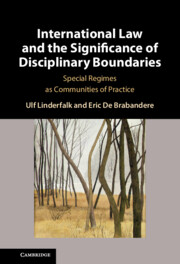 International Law and the Significance of Disciplinary Boundaries
International Law and the Significance of Disciplinary Boundaries Published online by Cambridge University Press: 21 November 2024
This chapter addresses the suggestion that for a special regime to exist, community members must have a shared repertoire. In the context of international law, to claim that a group of international law specialists have a shared repertoire is to assert that they consider the use of certain rhetorical tools appropriate. As Chapter 5 argues, the existence of such a presupposition can be inferred from, amongst others, the use by specialists of distinct concepts, a distinct terminology, a distinct method, and distinct theories.
To save this book to your Kindle, first ensure [email protected] is added to your Approved Personal Document E-mail List under your Personal Document Settings on the Manage Your Content and Devices page of your Amazon account. Then enter the ‘name’ part of your Kindle email address below. Find out more about saving to your Kindle.
Note you can select to save to either the @free.kindle.com or @kindle.com variations. ‘@free.kindle.com’ emails are free but can only be saved to your device when it is connected to wi-fi. ‘@kindle.com’ emails can be delivered even when you are not connected to wi-fi, but note that service fees apply.
Find out more about the Kindle Personal Document Service.
To save content items to your account, please confirm that you agree to abide by our usage policies. If this is the first time you use this feature, you will be asked to authorise Cambridge Core to connect with your account. Find out more about saving content to Dropbox.
To save content items to your account, please confirm that you agree to abide by our usage policies. If this is the first time you use this feature, you will be asked to authorise Cambridge Core to connect with your account. Find out more about saving content to Google Drive.